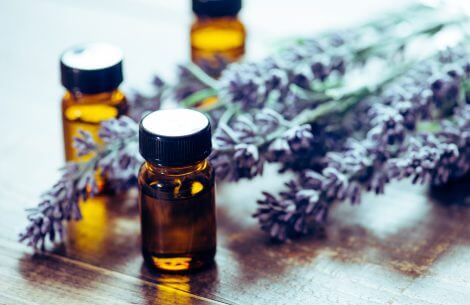While, the term, “aromatherapy” is relatively new, the therapeutic use of essential oils has a long history. Ancient Chinese, Egyptians, Indians, Persians, Greeks, Native Americans, and others used essential oil therapy for medicinal, spiritual, and religious reasons. It was French chemist, René Maurice, in the 1920s who coined “aromatherapy.” As a perfumer, he wanted to differentiate between essential oils used to make perfume and used for medicinal use.
Essential oils are highly concentrated oils distilled from plants. The scent and chemical compounds of the plants carry over to the oil, which makes them a potent therapeutic tool. The chemicals in plants that protect them from insects, bacteria, and viruses are also thought to benefit humans in the same way. Essential oils can range from $4 an ounce to $180 for a 1/8 of an ounce of organic rose essential oil. They are also graded with therapeutic essential oils being the highest grade.
How Does Aromatherapy Work?
Essential oils contain hundreds of chemical plant compounds, such as hormones and vitamins. However, an individual essential oil can have multiple chemical compounds. The complex nature of organic constituents is what makes them a compelling therapeutic tool, and why they work on many levels.
When inhaled essential oils are believed to stimulate the nervous system which sends a message to the brain’s limbic system that controls emotions and memory. In turn, physiological responses of the endocrine, immune, and other systems are triggered. These responses can affect the heart rate, blood pressure, respiratory system, brain waves, hormones, etc.
The body’s response to aromatherapy can relax or stimulate it. In addition, some essential oils have anti-microbial, antiseptic, antiviral, antibacterial, anti-fungal, etc. properties. When applied to the skin, they can heal skin conditions. Also, there is the theory that the body receives these actions when essential oils are absorbed through the skin. Under the strict supervision of a healthcare practitioner certified in the use of aromatherapy, a few essential oils may be taken internally.
Benefits of Aromatherapy
The benefits of aromatherapy are so widely used in areas of Europe that some conventional doctors include it as part of their practice, and health insurance companies cover aromatherapy treatments. While the U.S. is not there yet, research is being done on the health benefits of essential oil with promising results. Below are some ways essential oil therapy is known to help.
Skincare – Certain essential oils combined with a carrier oil or added to skin care formulas improve conditions, such as acne, eczema, psoriasis, rashes, insect bites, wounds, and scars. Essential oils also help to reduce the appearance of wrinkles, moisturize dry skin, and improve the texture of skin. They can also reduce the signs of dandruff and seborrhea.
Induce Relaxation – Aromatherapy for relaxation is one of the most used treatments. Lavender essential oil is widely used to calm and reduce anxiety. However, inhaling too much can have the opposite effect.
Improves Mood – Certain essential oils, such as orange and peppermint essential oil, can lift the spirit, which can help with depression and anxiety. Research showed citrus essential oils helped with depression related fatigue.
Better Sleep – Aromatherapy is used to induce sleep and helps with insomnia. Rose, lavender, vetiver, ylang-ylang, and cedarwood are some essential oils that help with sleep.
Treat Respiratory Infections – Essential oil therapy is also used to treat colds and other respiratory infections. When used in a diffuser, eucalyptus or tea tree oil particles are dispensed into the air. The scent can open passages, but the particles will also have the antibacterial and antiviral properties these two essential oils have. Also, essential oils can be part of a tonic that is massaged into the skin.
Reduces Side Effects of Cancer – A study in the American Journal of Hospice and Palliative Care found aromatherapy decreased pain, anxiety, depression, and provided a sense of well-being to cancer patients.
Relieves Muscle Stiffness – When massaged into the skin, essential oils relax muscles and reduce the pain from muscle stiffness and spasms.
Improve circulations – Aromatherapy has been shown to improve circulation. Ginger, rosemary, and cypress are three essential oils known to increase blood flow. A few drops can be mixed with baths salts or a carrier oil, such as almond, olive, or sunflower then added to a bath.
Contraindications
Aromatherapy provides many health benefits; however, they aren’t for everyone. Some essential oils can cause lung spasm, so people with asthma should avoid them. Also, a pregnant woman should avoid essential oils because a few of them can cause contractions. Nursing moms may want to seek the advice of their doctor before using aromatherapy. Many essential oils are photosensitive; using them causes the skin to be sensitive to the sun. Check with your doctor before using essential oils.
The Alliance of International Aromatherapists aptly describes the multifaceted benefits of the essential oil therapy, “The field of aromatherapy activity is quite wide, ranging from the deep and penetrating therapeutic actions of essential oils to the extreme subtlety of fragrance on the psyche. One of the uses of aromatherapy is to strengthen the self-healing processes by preventative methods and indirect stimulation of the immune system.”
References:
- Brent, Bauer A., MD. What are the benefits of aromatherapy? Retrieved from https://www.mayoclinic.org/healthy-lifestyle/consumer-health/expert-answers/aromatherapy/faq-20058566.
- Aromatherapy (January 1, 2015). Retrieved from https://craighospital.org/resources/aromatherapy.
- Aromatherapy, History and Basics. Retrieved from http://www.alliance-aromatherapists.org/.

